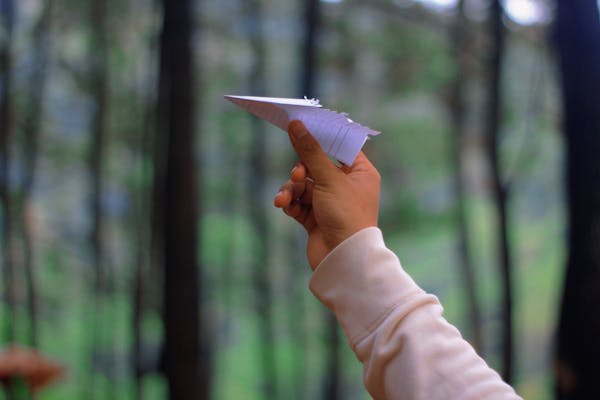Table of Contents
[ad_1]
Few would connect vaping with armed drones. But in a fast paced workshop in Kyiv, disposable digital cigarettes have turn into the newest weapon of war.
Across the country, Ukrainians have released groundbreaking initiatives to assist and even arm the Ukrainian army versus Russia, soon after President Putin’s considerably greater army invaded in February.
A new and unusual a single has just been introduced by engineer and PhD student Maksym Sheremet and his organisation “Drone Lab”.
His staff of volunteers have established up fall-off bins outside the house the campuses and dorm rooms of Kyiv Polytechnic Institute, in which Sheremet scientific tests and teaches, to gather disposable e-cigarettes and retrieve a important commodity within them: lithium polymer batteries.
The batteries are being applied to energy release methods hooked up to drones so that they can carry and fall something from health-related provides to grenades. The launch techniques are crafted employing 3D printers.
“We began accumulating e-cigarettes right after the price tag of lithium batteries truly rose a month in the past,” the 26-year-previous tells The Unbiased from his workshop which was littered with fifty percent-built drones and 3D printers in an undisclosed area in the money.
Because the state experienced to near its airports at the commence of the war, imported products have turn into increasingly tough to get hold of and so pricey.
“Lithium batteries utilised to charge $1 every but went up five periods in price introducing substantially to our fees,” suggests Sheremet. “So we began powering dropping techniques from the batteries in disposable e-cigarettes. It’s totally free, uncomplicated to repurpose and environmentally pleasant for the reason that we are recycling.”
A crew of about 60 volunteers are making the drone techniques, with 30 doing work exclusively on the e-cigarette strategy.
In four months they have developed 4,000 dropping units – which value underneath $30 – and are sent to the entrance. They are also constructing drones from scratch and repurposing current business drones to go with their dropping programs. A few weeks ago they started off operating with e-cigarette batteries.
“In the past 20 times, we’ve designed 100 drone dropping techniques applying e-cigarette batteries and have another 100 in progress,” the engineer continues, keeping one drone they made which has a thermal digital camera on it.
“We have 2,000 orders in the pipeline.”
He says it was his way to lead to the war effort and hard work.
Sheremet’s workforce are also producing drones like this a single which can carry two grenades
(Bel Trew)
“There are persons who want to support and do not know how to shoot a rifle. Our mind is our weapon,” the engineer proceeds.
“We have students, engineers, volunteer programmes… it’s extremely effortless to solder this things, it is not a tough work.”
The Ukrainian army has consistently pleaded with Western powers for arms as it has run lower on ammunition and weaponry even though Russia has pushed on with a ferocious offensive now concentrated on the east of the country.
In June, Ukrainian armed forces intelligence officials claimed that Russia has up to 15 instances much more artillery than Ukraine does, that means it is seriously outgunned.
Drones have as a result develop into essential in the fight, allowing Ukrainian forces to place artillery and so direct hearth competently, conserving ammunition. Some of the drones can also fall anything from anti-personnel grenades to compact bombs or ferry professional medical supplies to soldiers in difficulties.
There are individuals who want to assist [the war effort] but do not know how to shoot. Our brain is our weapon
Maksym Sheremet, engineer at Drone Lab
At the get started of the war, Ukraine’s defence ministry urged drone entrepreneurs to switch in their equipment to the army. On Friday Ukrainian media reported that the military experienced released a different drone travel: a fundraising task to resource or crowdfund the acquire of 200 Scout drones.
“We do the job from donations and private financial investment so we never demand the army everything,” Sheremet proceeds.
“There is not a highest weight to what the drones can hold – it’ll depend on the dimensions of the drone and the launch.”
The e-cigarette undertaking has unforeseen aspect gains, he claims as it will help with recycling and is safer than students just chucking their units absent.
E-cigarettes have impressive batteries which are intended to be recharged. The disposable equipment have no USB charging points and so are discarded in some cases after a single use.
Maksym Sheremet solders a release product for a drone applying a battery from an e-cigarette
(Bel Trew)
This, Sheremet suggests, is a colossal squander. It also poses a threat to waste and recycling personnel: there are even calls in international locations like the United States to create greater legislation to control the equipment amid reports of e-cigarettes and their batteries catching fire and even exploding.
Sheremet and his crew have set up assortment details across the university. They recycle the plastic vape casing, maintenance and recharge the batteries, and location them in recharging cases so they can be used yet again and once more. In the workshop he demonstrates how quick it is to extract the battery, solder the mechanism and connect it to a board.
“You cannot set electrical cigarettes in the trash because of the lithium battery, it is a major hearth danger and awful for the natural environment,” he concludes as his crew are hectic driving him.
“So our strategy has advantages for the army, the atmosphere and protection.”
[ad_2]
Source connection







